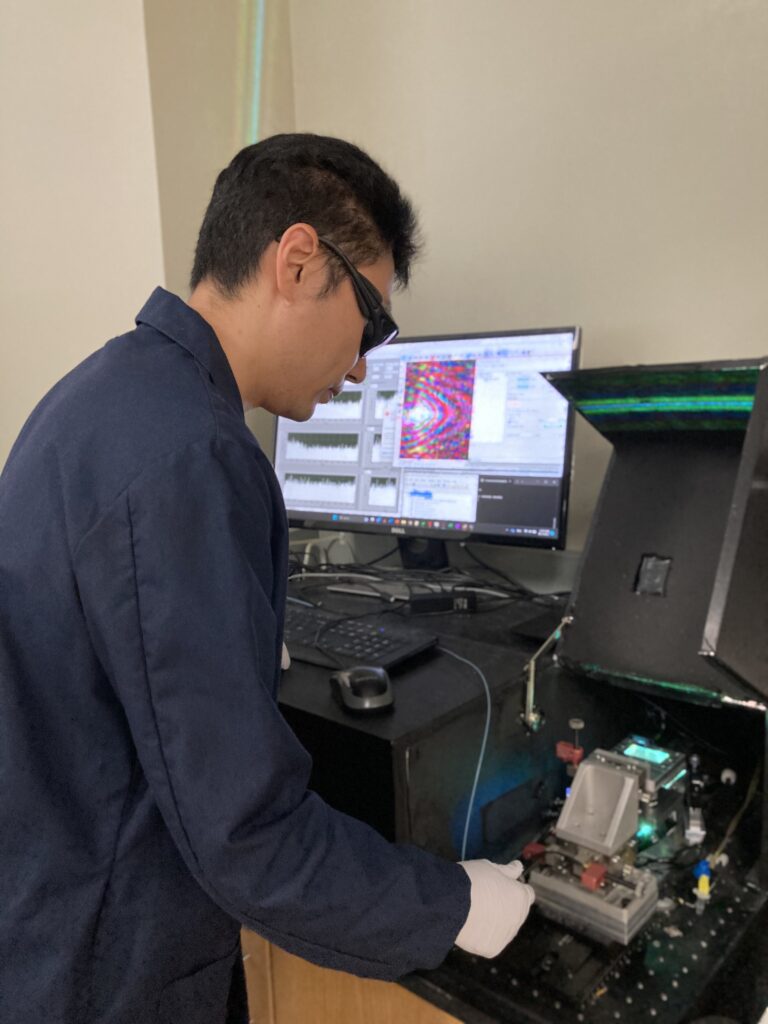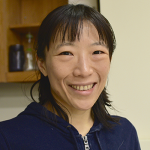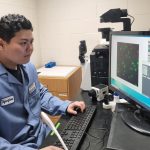Innovative device may hold the key to unlocking the potential of mRNA therapeutics

While many only recognize mRNA as the crucial component in COVID-19 vaccines that have helped protect more than 230 million people around the world from contracting or developing severe disease since the pandemic began, messenger RNA therapeutics have the potential to treat various infectious diseases, autoimmune conditions, genetic disorders, and even cancer. However, the effectiveness of mRNA interventions depends—at least in part—on a tiny blob of fat known as a lipid nanoparticle. A million times smaller than a soccer ball, LNPs are the vehicles used to carry mRNA vaccines and medications into the cells to do their work.
CICS Analytics, a company founded by Sixuan Li, an engineering graduate student and research assistant in the Whiting School of Engineering’s Department of Mechanical Engineering, and his PhD advisor, Jeff Tzai-Hui Wang, the Louis M. Sardella Professor in the Whiting School of Engineering’s Department of Mechanical Engineering and a core researcher at the Institute for NanoBioTechnology, have developed a device that allows researchers (and, potentially, drug manufacturers) to peer inside LNPs to measure their mRNA payloads: a step to ensuring that the snippets of genetic material comprising mRNA therapies make it to the target cells intact.
“This device has the potential to offer unprecedented level of accuracy in analyzing individual mRNA nanoparticles, providing comprehensive details to uncover unknowns, improve the design of therapeutics, and optimize the effectiveness of nanomedicines,” said Li, president of CICS and a member of the laboratory of Wang.
CICS’ platform employs cylindrical illumination confocal spectroscopy—a technique that uses focused light to study objects —to tag mRNA and LNP components with fluorescent markers before sending them through a detection plane and measuring their intensity.
This device comprehensively analyzes critical nanoparticle attributes such as the percentage of empty particles, drug payload capacity and distribution, particle size, concentration, and encapsulation efficiency. This analysis can help optimize the design of nanomedicines, reducing development time and cost, improving safety, and increasing the effectiveness of nanomedicine therapies.
“Our vision is that this will be a benchtop instrument for analyzing nanoparticle formulations,” Li said, “and it will be added as part of the analysis suite, that will be used on a regular basis or routinely by nanomedicine producers.”
The next step is to develop a working prototype that potential customers can use to evaluate their own samples. Having already built several iterations of this device, Li and his team are now focused on refining the third iteration for commercial use.
According to Li, early feedback has been very positive and there is “strong interest” from pharmaceutical and biotech companies who recognize the need for the startup’s product. He estimates that within a year the initial units of this product will go from the production stage to being sold commercially.
“Right now, we need to know why we can make this, why we can bring it to the market, and why this product has strong utilities,” Li said. “We’re in the process of talking to regulatory personnel as well as looking into regulations to see why and how this could be a promising tool that could offer a lot of information in nanoparticle assessment.”
Li and CICS Analytics were among more than 100 early-stage venture firms selected as semifinalists for the Eli Lilly and Company-sponsored 2023 Activator Program, which provides up to $100,000 in grants. Though they were not selected, Li considers the process “a vote of confidence.”
”This use cases of this device can be extended to analysis of other types of nanoparticles and we believe there is a huge market for this going forward,” Li said.
You can read more about Li’s research on LNPs in a recently published article to GenScript here.





